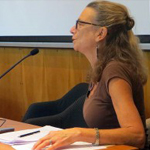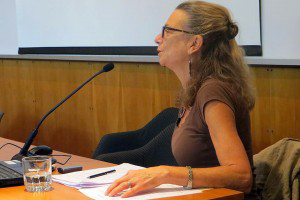WEIL LEADS WORKSHOPS IN CHILE ON TRENDS IN AMERICAN ANIMAL STUDIES

Stray dogs are e

verywhere in Santiago, Chile. They lie on sidewalks, wander the parks, and even cross busy streets unaided. No one seems to mind; they’re just part of the culture.
For Kari Weil, University Professor of Letters, they also were a striking reminder of the purpose of her recent trip to Santiago. At the invitation of the U.S. embassy there, she visited the Pontificia Catholic University of Chile, Jan. 6–9, to discuss current trends in American animal studies.
Although academics have studied animals from various perspectives for a long time, animal studies as a cross-disciplinary field has come into its own fairly recently. The field, developing robustly in the United States, draws the attention of scholars in areas such as anthropology, film studies, psychology, literary studies, and philosophy. At Wesleyan, Weil and Lori Gruen, professor of philosophy, have led the development of an Animal Studies program with courses ranging from Animal Theories/Human Fictions to Applied Animal Welfare Science and Bioethics and the Animal/Human Boundary. They also cosponsor a summer fellowship in animal studies at Wesleyan, in conjunction with the Animals and Society Institute.
In some areas outside the United States, scholars have less familiarity with animal studies. Weil led a series of workshops designed to introduce the field to an eclectic gathering of faculty from universities in the Santiago area. Her intent, she says, was to help them understand how animal studies has become a vibrant area of study that chips away at anthropocentric views and raises questions about whether and how one can gain access to another being that cannot communicate in human language.
Her workshops were followed by a roundtable of academics beginning to work within animal studies in Santiago.
“What was exciting to them about animal studies was that it forces people from different disciplines to talk to each other,” she said. “One participant said that in Chile interdisciplinary gatherings of faculty almost never happen.”
Stray dogs, part of the culture in Santiago, wander the grounds of Catholic University and never seemed far from workshop conversations. Participants heard from a Chilean filmmaker, Sergio Castilla, who was releasing a film in April inspired by a stray dog he adopted. Earlier, Weil discussed the poem, “Pink Dog,” by Elizabeth Bishop, that connects stray dogs’ bodies with women’s bodies, and raises questions of gender, class, breeding, and community.
Animal studies poses questions about agency, and Weil notes that the word is difficult to translate into Spanish. The concept also runs somewhat counter to Catholic doctrine, which states that animals don’t have souls and traditionally portrays them as here for humans to use. Animal studies challenges this point of view.
“Whether it’s the stray dogs or Mathilde [Weil’s family dog], they have a way of influencing us, of getting us to do things and think about them in certain ways,” she said. “That’s what I was trying to push: How do animals have agency? But also, when and why do we push back against this idea, wanting to claim our independence from them?”
She noted that it’s stimulating to consider how one can represent their perspective on the world when you cannot know it with certainty.
The workshop topics produced spirited discussion, she said, adding, “There was a good response, good feedback. Even the dog who visited the lecture room seemed pleased.”
